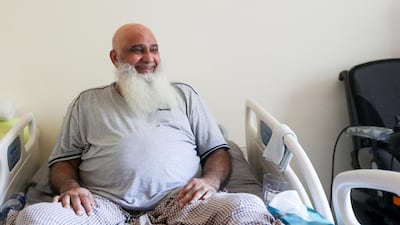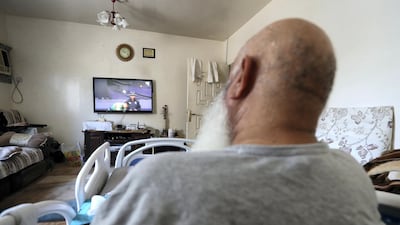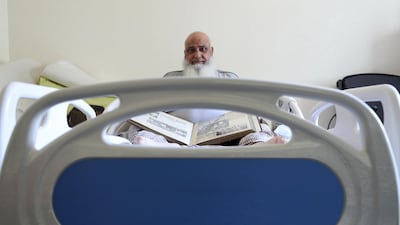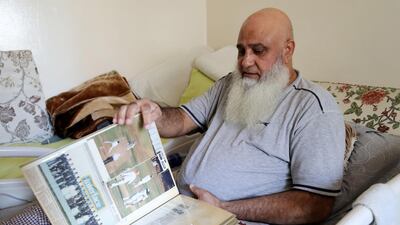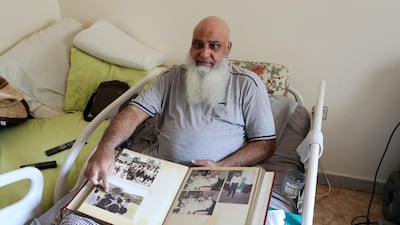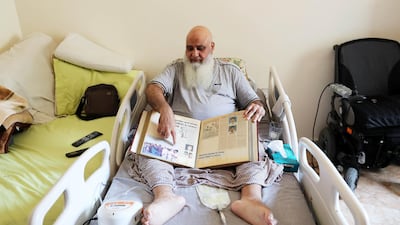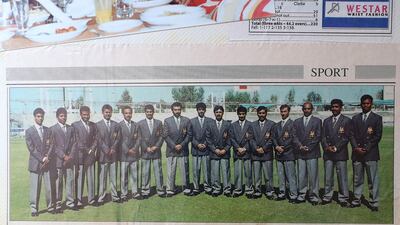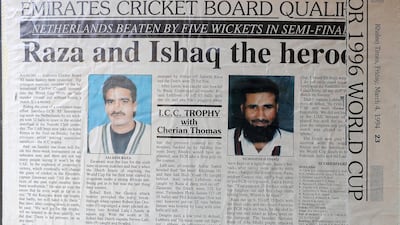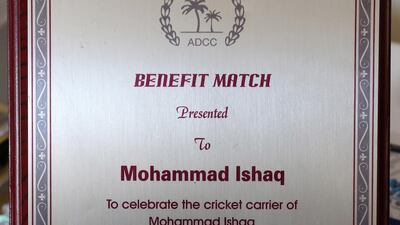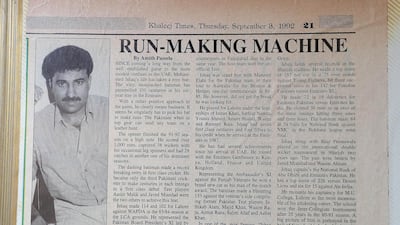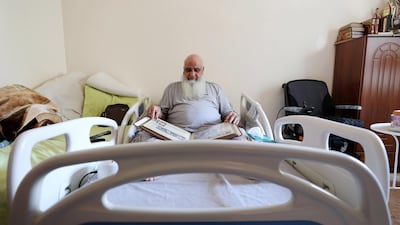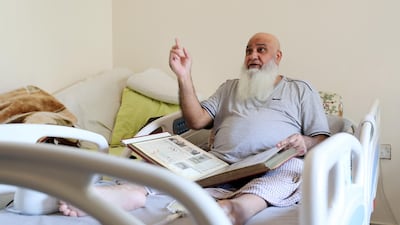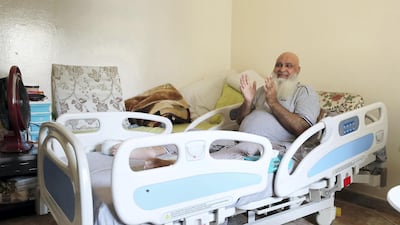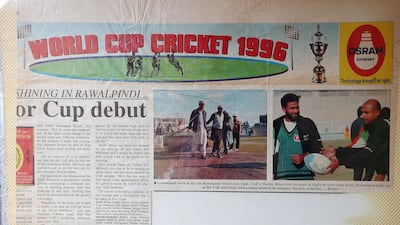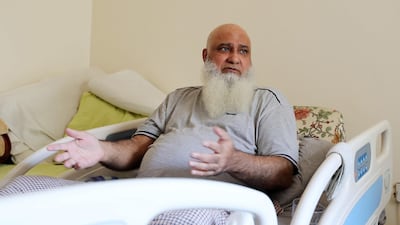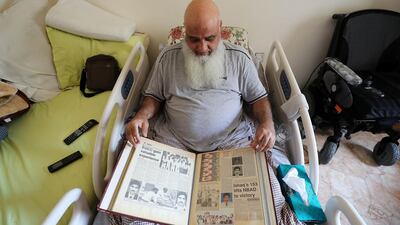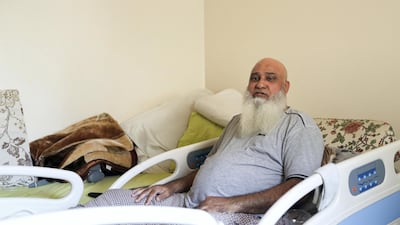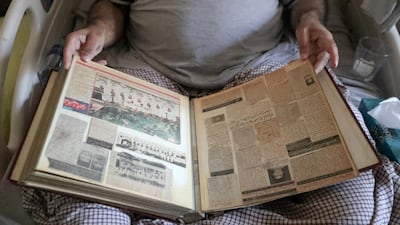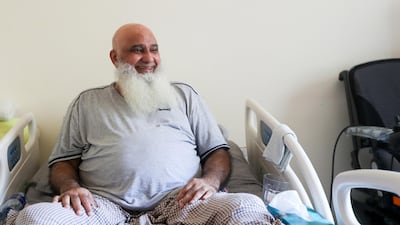Mohammed Ishaq picks out a date from a bowl that is set between his legs, dips it into his cup of milky tea, and takes a bite. He has barely started chewing before he merrily spits out the words: “Shot, yaar!”
The wall-mounted, widescreen television in his front-room is showing the Cricket World Cup. The long-term care bed in which he is reclining is tilted at just the right angle that he can view the action in comfort.
He is loving the contest. You might think it would prompt him to reminisce about the time he himself played at the World Cup, back in 1996, as part of the pioneering UAE side that represented the country at a major competition for the first time.
But not a bit of it. He is too invested in the present. His favourite player is Eoin Morgan. “He uses the long handle, a bit like I used to,” Ishaq says, revelling in the England captain’s recent spate of six-hitting excellence.
He reckons West Indies are underachievers. “Every West Indies player is a match winner – so why are they not winning? Because they don’t have combinations,” he says. “The same for Pakistan.”
And he adores the commentary of Michael Atherton and Nasser Hussain. “I’m not like you busy people,” he says. “I get to hear everything they have to say.”
Ishaq, 56, has been confined to this room for the past four months. His doctor advised that he no longer use his wheelchair, as they attempt to heal the seeping wound of a pressure sore near his hip.
It is almost exactly 10 years now since he was involved in a car crash, while in Saudi Arabia for Umrah, which rendered him with “T12 complete paraplegia” – leaving him permanently disabled.
He is confident he can get back into his chair and the relative mobility that affords. It is just a matter of time. For now, he has to lay back, ease the pressure on his hips, and wait.
Self-pity is entirely absent in this warmest of family homes. He finds the idea that his might be a tragic story entirely disagreeable.
“Why would we be unhappy?” he says. “There is no reason, my dear.
“When you have life, you have to enjoy it. This is not in our control. He who has made us knows very well. Alhamdulillah, I am a good believer. That belief carries me.
“Not even for one day did I ask in my heart, ‘Oh, what has happened to me?’ I am happy. Life has ups and downs. But I am managing.”
At Ishaq’s second-floor flat, near the intersection of Hamdan Street and Al Meena Street in Abu Dhabi, two things are inescapable.
Cricket, in the form of the live broadcast on the television, in the pictures in the scrapbook beside his bed, and the trophies that are evidence of the glories of his playing days.
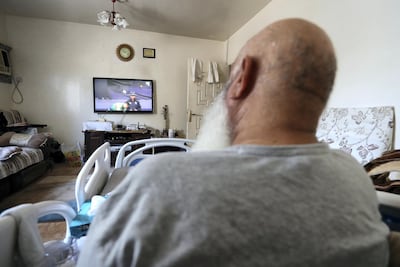
And Islam. Above the lintel of the front door to his flat is Arabic script saying, “Mashallah,” while above his bed is a verse from the Quran.
“On that road, if people have an accident, mostly they die - it is a very dangerous short-cut,” he says.
“But Allah saved me and my children. Allah chose me. My wife and [five] children were all in the car with me, and they were all fine, Alhamdulillah.
“If I get an injury, that is survivable. If my children are hurt, that is more painful.
“If your son or daughter sneezes, you are worried. If the same happens to you, no problem. You could sneeze 100 times in a day, and it would be OK.
“If it was your child, you would want to check what was wrong, take them to the doctor. This is nature.”
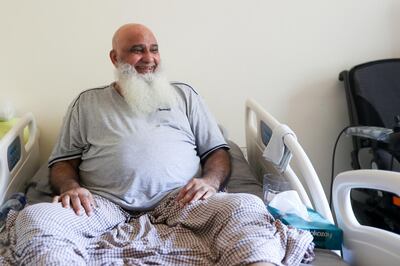
Ishaq does have worries. He has lived in the UAE since 1987, when straitened financial times for his family in Lahore led him away from his promising cricket career – a call up to the Pakistan team was within reach, he says – and to a job in a bank in Abu Dhabi.
Now, 32 years later, his time in his adopted homeland might be running out. His residence visa is due to lapse in November.
He was employed by National Bank of Abu Dhabi for 30 years, even after his accident – for “humanitarian reasons”, as he puts it - until their merger with First Gulf Bank in 2017.
“NBAD were like a mother to me,” he says. “They were fantastic. Few companies would do anything like NBAD did with me. I will remember that for all that is remaining of my life.”
As the youngest child of eight, he does have family back in Pakistan, but he wants to stay in the capital, where he has raised his own children.
“As a human being, I am sometimes worried about things, like my visa,” Ishaq says.
“But you need to be always positive. Always, to the last day in this world, remain positive.
“If you are like that, your soul remains powerful. Don’t think anything against anyone in your heart, and you will see how happy you are.”
Ishaq acknowledges he has not always had quite such a pacific nature.
“When I was around 15, I remember having a fight with a boy while playing cricket,” he says.
“I punched him, and hurt my fingers. After that, I realised I didn’t want to fight with anyone.
“But when you are playing sport, you have to fight. This is a war, when you are on the field. I had fights with all of the players in the UAE – not with fists, but with the ball and bat.
“I was a very good fighter in the ground. Always. I was never afraid.”
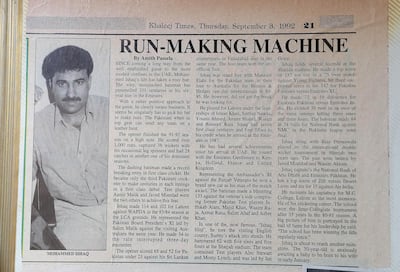
It was a mindset that served him well. Ishaq estimates that he scored over a hundred centuries in UAE domestic cricket. He was the player of the match in the final of the ICC Trophy in 1994 – the tournament that sealed the UAE’s first appearance on cricket’s global stage, at the World Cup two years later.
And playing in his home city of Lahore, he was at the wicket when the national team sealed what remains their sole victory at a World Cup, making 51 not out in the win against Netherlands.
During that tour, he roomed with Saleem Raza, a fellow product of Lahore who has also fallen on hard times in recent years, with his eyesight failing as a result of the onset of hereditary diabetes.
Despite his own predicament, which includes annual trips to the UK for treatment, Ishaq says he does his best to help out his former teammate. “Ishaq isn’t just my friend, he is my brother,” Raza says.
While Raza played on for years after the World Cup, Ishaq retired from national duty just two years later, when the team’s coach asked him to give catching practice for some of the younger players.
That, he says, made him feel old – he was 35 at the time – and he was finished with all cricket within four years of that.
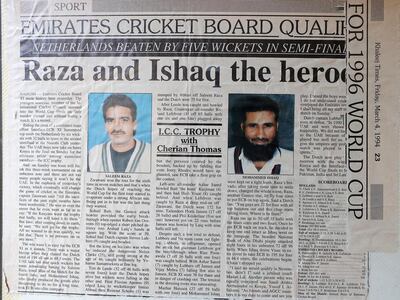
“When we were selected for the World Cup, we were already past our primes,” Ishaq says.
“My prime was in domestic cricket. You should have seen me play! People would come and see my arms, and want to see sixers.
“From the beginning, I was commanding. One time I played five matches in a week, and made five hundreds, in Pakistan domestic cricket.
“After the World Cup, I played sensible innings. I understood cricket after the World Cup – when I was setting like the sun.
“When a sportsman is in the field, it is like a rising sun. When they are out of the field, it is the sunset.”
